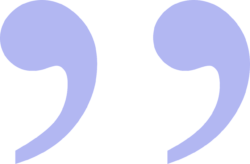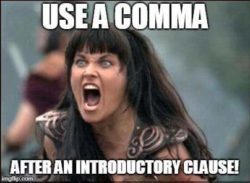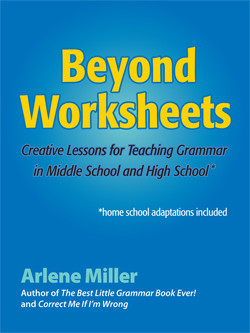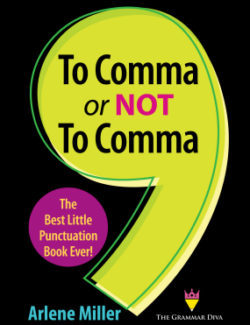Arlene Miller's Blog, page 36
February 22, 2019
Commas Part 1: Five Common Uses for Commas
 Commas: The bane of a writer’s existence. Depending on where you look, there can be ten — or tons — of comma rules. However, there are two main rules: 1. Don’t use a comma unless you have a reason (rule) to use it. 2. Use a comma anyplace where not using one would result in confusion for the reader. Simple, huh?
Commas: The bane of a writer’s existence. Depending on where you look, there can be ten — or tons — of comma rules. However, there are two main rules: 1. Don’t use a comma unless you have a reason (rule) to use it. 2. Use a comma anyplace where not using one would result in confusion for the reader. Simple, huh?
The purpose of punctuation is to make for easier reading. Without punctuation the reader doesn’t know where the sentences end, where there is a pause, or when a character is speaking. However, some punctuation rules, particularly those regarding the comma, don’t really make reading a whole lot easier. They seem superfluous, but we are told to use them anyway.
This post is Part 1 in a series of posts about using commas; it describes five of the most common uses for the comma.
1 A compound sentence contains two (or more) complete sentences connected with a conjunction. These connecting conjunctions include and, but, for, nor, or, so, yet.
We studied for about an hour, and we didn’t feel as if that was long enough.
We studied for an hour, we watched an hour of television, and we studied for another hour.
If you don’t use the conjunction, you need to use a semicolon. This construction is still considered a compound sentence.
We studied for an hour; we didn’t feel that was long enough.
If the two sentences are short, you don’t need the comma.
I watched TV and I went to bed.
If the second sentence isn’t really a complete sentence, do not use a comma. Usually what is missing is the subject of the second sentence.
We studied for about an hour and didn’t feel as if that was long enough.
2. The series comma is probably the most well-known use of a comma. Items in a series need commas to separate them. The comma before the and is optional. That comma is called the Oxford, or series, comma. I like it, but it is not necessary. Two things to remember: If you decide to use the Oxford comma, use it consistently within a piece of writing. Don’t alternate between using and not using it. The only exception is to put it in when the meaning of the sentence would be confusing without it — even if you have not been using it in that piece of writing.
This recipe calls for apples, pears, cranberries, and walnuts for the filling. (Oxford comma used.)
This recipe calls for apples, pears, cranberries and walnuts for the filling. (No Oxford comma.)
The dog ran out of the kitchen, into the yard, across the street, and over the fence. (A series of phrases.)
The dog ran out of the kitchen, into the yard, across the street and over the fence. (No Oxford comma.)
I went into the kitchen, I put the steak in the oven, and I washed the dishes. (Series of sentences – compound sentence.)
I went into the kitchen, I put the steak in the oven and I washed the dishes. (No Oxford comma.)
3. Commas are used in dialog to separate it from the rest of the sentence.
She said, ” I don’t like the rain.”
“I don’t like the rain,” she said.
“I don’t like the rain,” she said. “I wish it would stop.”
“I don’t like the rain,” she said, “and I wish it would stop.”
4. Use commas before and after etc. (and so on), i.e. (that is), and e.g. (for example).(Don’t forget the periods.)
You can make a fruit salad with any fruit: apples, oranges, pears, berries, etc.
I knit socks, sweaters, scarves, etc., for my grandchildren who live in a snowy climate.
She is the captain of the cheerleading squad, i.e., the leader of the cheers.
You need to take advanced math, e.g., calculus, to get into that school.
5. Salutations and closings of letters and e-mails use commas.
Dear Frank, (but in a business letter, a colon is more commonly used: Dear Ms. Symes:)
Sincerely Yours,
February 13, 2019
Best Grammar Activities That Will Teach Your Kids To Cooperate
The following is a guest post by Joel Syder.
Should you really mix games and grammar? Most teachers say yes. It’s a great mix that gets children to learn effortlessly and without you having to yell or scream to get their attention. It’s also well known that children learn best when playing.
Old teachers might say no to this method because they just don’t want to mess with what works. But language is fun and fluid, and it definitely doesn’t belong in door-stopper textbooks. So, get creative and come up with some games for your classroom. Your students will love it!
Why Use Games?
Grammar isn’t always best studied through traditional methods. It can be a bit dry and boring. However, games make it fresh and exciting, especially for children. Just think about it: after learning all day, students come to your class, but their minds are not ready for more dry information. But you know what they will be ready for? Playing. Their minds will relax and they will learn things with ease.
Here are some of the benefits of using games in your classroom:
They shake things up — When kids can use something in a fun way, they will definitely remember it and store it with no problems. They will be able to take your messages as fun facts and learn in a way that creates a visual example of what to do. Grammar is boring. But games are definitely not. Plus, your students will love and look forward to your class.
Games help develop competition — “Grammar games are motivational and they boost competition which is always healthy and good. Students have to strive to be the best, outperform their peers and simply be the best in the classroom,” says Leslie Ruben, proofreading expert at 1Day2write .
Cooperative learning — When you create teams, you can create a bonding experience between the students and help students with a bit less knowledge learn a lot better. They will all have someone to cheer for them, and that’s one of the best things about this.
Get energy levels up — Start teaching grammar and you’ll notice that your students doze off. However, introduce a game and your students will all jump with joy and start focusing immediately. Everyone will want to participate.
Amazing Grammar Game Strategies
Here are some of the activities that students could do to have fun and learn at the same time. Keep in mind that you can adapt them to lower or higher levels of knowledge easily.
Group quiz + personalized sentences
This activity is created for practice stages of the lesson. You have already introduced the rules and language to the students; now you have to allow them to practice. Your goal is to make the rules that you have set memorable. Provide personalized addition to make things even easier to remember. You can put an example on the board and ask for the full sentence from the students. Write their ideas on the board. Ask for personalized verb-noun collocations. They can use it for reference later.
Divide the class into groups and give them a set of quiz cards; allow them to work on their own to complete the cards, for instance, “I would like to be able to cook well” and then on the next, “I am able to play football very well.”
Then when you collect the cards, you can start a quiz where the class would have to guess who wrote the sentence.
Error correction
“This is a fun game, which can be done quickly and turn errors into a fun and competitive experience. You can create a list of sentences, each having an error and then ask students to find corrections for these sentences. You can either split them into a few teams and create a scoreboard or they can work in pairs,” says Marty Richard, English teacher at Writemyx and Britstudent.
Team gap fill
This is a short game where the students can revise their lessons. Write sentences with gaps on the board. Divide the classroom into teams and give each a different color marker, create a scoreboard, and start the competition. Each team should give an answer — you can create gaps for this as well. Allow them to discuss their answers amongst themselves, but don’t allow them to discuss this for too long. The game should progress fairly quickly, with some time to reflect on why something is correct or incorrect. Let them write their answers at the same time. Give two points for a perfect answer and one for being close to the solution.
Learning grammar doesn’t have to be that hard. It can be a fun activity for you and your students. Use some of these techniques to make your lessons easy to remember and fun for the entire classroom.
Joel Syder works as an online English tutor and education writer at
Academic Brits
and
Origin Writings
. He enjoys helping people  learn English language online as well as creating articles about things that excite him for
Australia2write
, academic service.
learn English language online as well as creating articles about things that excite him for
Australia2write
, academic service.
From the Grammar Diva
Having taught 7th grade English for 11 years, I completely agree with this post. Grammar is dry, but if you spice it up with some games nd competition, kids can enjoy it. I don’t remember quite how I figured this out, but I started using games early on….I never thought of them being good until my student teacher suggested I put them all in a book. So I did. I have an e-book of about 25 games I used for grammar. It hasn’t done much on Amazon, but it has done well on a site called Teachers Pay Teachers, where it has many great reviews. Here are a few more suggestions for games:
I used to play Parts of Speech Jeopardy with the class, divided into two big teams. All my stuff was low tech, so I made the game on my whiteboard. Students took turns choosing a lettered column and a dollar value. The bigger the value, the harder the question. I had all the questions, so I read the question, and if the student to it right, the team got that dollar value. If a person on neither team got it right, the team who had the question originally could work together to come up with the answer. They loved this game.
To get ready for Greek and Latin roots test, I would play bingo. I would hand out the boards and put the list of the 25 roots on the whiteboard. They filled in their boards however they wanted to. One by one, I would read the definition of the root. They would find where it was on their boards and X it out. When they got bingo, the first several would get candy. And there was NO free space!
Like the games in the post, I worked on sentence structure-type things too. I used index cards. I might put a dependent clause on some cards and an independent clause on another and hand them all out randomly. The students had to search for a clause that made a sentence that made sense. This one got them moving around the room too!
February 8, 2019
You Can Quote Me on This Too: Quotation Marks, Part 2
 Last week’s post was about using quotation marks in dialogue and direct quotations. There are several other uses for quotation marks, and we will talk about those in this post.
Last week’s post was about using quotation marks in dialogue and direct quotations. There are several other uses for quotation marks, and we will talk about those in this post.
Words from Another Source: Use quotation marks if you are using a word or phrase that comes directly from another person or source:
She said she had a “surefire strategy” for getting the job.
The article said that if I used this product my house would be “cleaner than clean.”
Sarcasm: You can use quotation marks to indicate sarcasm.
Don’t you think she looks like the “belle of the ball” in that ugly dress?
Slang Words and Expressions: You can use quotation marks for slang words and expressions that are not the usual part of someone’s speech.
He told me he didn’t have enough “bandwidth” to think about all the projects I was talking about.
Words intentionally spelled incorrectly: If words are spelled incorrectly in dialogue to imitate the way someone said the word or phrase, do not use quotation marks (which would be single quotes if you used them).
She told me she was finally going to get a “liberry” card.
“I think I will finally go get a liberry card,” she told me.
Titles: Some titles are put in quotation marks; other are put in italics (or underlined if you are writing by hand). You never use both quotes and italics for the same title. Generally speaking, pieces of larger things are quoted, while the larger thing is in italics. Book titles, movie titles, names of newspapers and magazines, television series titles, music CD titles are in italics. Use quotation marks for chapter titles, TV episode titles, song titles, article titles.
Unusual Use in a Sentence: Use quotation marks for words and phrases that have an unusual use or abnormal placement in a sentence.
I didn’t like her “I-am-better-than-you” attitude.
Definition of a Word in a Sentence: Put quotation marks around the definition of a word in a sentence. The word itself should be in italics.
She informed me that the word enervate means “to weaken” even though it sounds as if it might mean the opposite of that.
Jargon: Jargon is language used and understood by a specific group of people, for example, teenagers, doctors, lawyers, computer programmers. If you are writing to an audience familiar with the jargon, you need no quotation marks. If you are writing to an audience that may be unfamiliar with the word, put it in quotation marks the first time you use it in a piece of writing.
The computer expert told the novice that she was going to be backing up to the “cloud.”
After Labeled or Marked: Use quotation marks around words that follow labeled or marked.
Be careful with the big box that is labeled “Fragile. This side up.”
There are also some places where you might think you need quotation marks, but you do not.
1. You don’t need quotation marks around yes or no unless they are part of a direct quote.
Answer yes to any of the questions below if they are true.
When I asked her if she was married, she replied, “yes.”
2. You do not need quotation marks around common and familiar expressions and idioms.
Wow, it is raining cats and dogs this morning.
I was just pulling your leg when I told you I had a gift for you!
3. Do not use quotation marks around indirect quotes.
When you asked me ten minutes, ago, I said that it was not raining.
—————————————————————————
Find these punctuation standards as well as standards for all other punctuation marks in my latest book!
February 1, 2019
You Can Quote Me on This: Quotation Marks
 People always have questions about using quotation marks. This post will talk about using quotation marks in actual dialogue. But quotations marks are used for other things besides direct quotes from people speaking. Next week’s post will talk about those other uses for quotation marks.
People always have questions about using quotation marks. This post will talk about using quotation marks in actual dialogue. But quotations marks are used for other things besides direct quotes from people speaking. Next week’s post will talk about those other uses for quotation marks.
Single quotes. Single quotation marks ( ‘ ) have only one use: quotes inside of other quotes. If you are quoting someone and you need to put something in quotes inside that quote, use single quotation marks:
She said, “There must be a million songs with the title ‘I Love You,’ so I will call my song something else.”
He replied, “I haven’t actually heard any songs that are called ‘I Love You.'” (There is no space needed between the single and double quotes when they come right after one another. )
Quotation marks used with other punctuation. Simple rules apply here for American English. British English is different.
Periods and commas ALWAYS go inside the quotation marks, no matter what. No exceptions.
It isn’t that common to find semicolons and colons used with quotations marks, but if they are, they go outside the quotation marks, no matter what.
She announced, “I am so tired”; about 10 seconds later she was asleep.
Question marks (and exclamation points) can go either inside or outside, depending.
I heard Suzie ask, “Are we there yet?” (Quote is a question, but the entire sentence is not. But use no period at the end.)
Was that Suzie who said, “I hope we are there soon”? (Entire sentence is a question, but not the quoted part.)
Did Suzie ask, “Are we there yet?” (Both the whole sentence and the quote are questions. Use only one question mark. Inside.)
Examples of dialogue. Quotation marks are most commonly used for direct quotes and dialogue. A few authors have given up using quotation marks for dialogue and use dashes instead, for example, Cormac McCarthy. I would think it would be difficult to read unless the dialogue consisted of one liners, back and forth between two people.
— Give me that book!
–It’s mine, and I am not giving it to you.
–I just want to see the cover.
–No! I don’t want you to see it.
–Why? What is the big deal?
But most people still use quotation marks. Here are some examples of punctuating and capitalizing dialogue (or just direct quotes).
She said, “I expect you to be home by midnight.”
“I will try,” he replied, “but I am not sure I can get a ride that early.”
“Make sure you can before you go,” she said. “You will be grounded if you are any later!”
“I will try my best—”
“That isn’t good enough!” his mother interrupted.
Multi-paragraph quotations. Sometimes the same character will speak for more than one paragraph, or you will be quoting a speech that is multiple paragraphs long. How you do punctuate? Use opening quotation marks for every paragraph. Use closing quotation marks for the final quoted paragraph only.
NEXT WEEK: Other uses for quotation marks other than dialogue (or the exact words someone speaks).
January 25, 2019
What’s Going on with Amazon? and Other Complaints
 This is NOT a post about grammar — or punctuation. It’s a post about complaints. Mine. Now maybe I have simply become a whiny old lady who complains about everything. Or maybe I am just whining so you don’t have to!
This is NOT a post about grammar — or punctuation. It’s a post about complaints. Mine. Now maybe I have simply become a whiny old lady who complains about everything. Or maybe I am just whining so you don’t have to!
In any case, because of a reader request, next week I will be writing about quotation marks and their mysteries. And I would like to thank the people who wrote to me with blog post suggestions: Some said to repeat some old posts for newbie (or forgetful) readers. Okay. Some offered to write guest posts. Okay. And some offered suggestions for blog topics. Okay. Thank you all!
Now back to Amazon. There are really two Amazons: First, there is the Amazon that we (most of us) buy things from. For us writers, there is also the Amazon that publishes our books and pays us. I will deal with each separately.
Amazon, until a few months ago, had a publishing arm called CreateSpace, which published (and offered other services such as book design) print books. Kindle has always taken care of the e-books. CreateSpace had great customer service. Enter your phone number, and they would immediately call you, 24/7. Bye, bye, CreateSpace. Why? Who knows? I believe the reason given was better customer service (HA!). So we all had to migrate our books over to Kindle — before they had debugged everything. Customer service? Not 24/7. You have to wait until 6 a.m., and then they close around 5 p.m.
Then, there is this thing called AMS, Amazon Marketing Services. That is how one advertises books on Amazon. There used to be two kinds of ads: Display ads showed the book cover when someone was reading on a Kindle. I think the minimum cost for one of those ads was $100, and I don’t think they were effective. They are now being canceled. Then there are the “sponsored ads.” What the author does is choose keywords someone may use to find his or her book. Or any keywords that might apply to someone interested in a book like yours. So for me, grammar, grammar book, grammar workbook, commas, punctuation, etc., might be good keywords. But they say to have hundreds of keywords to improve your sales: titles and author names of competitor books, for example. For each ad (one book per ad), you pick the dates you want the ad to run and the maximum amount you want to spend each day. Then, you give each keyword a monetary bid amount. The more competition for that keyword, the higher your bid has to be for your book to be shown when someone types in that keyword. Well, this is all fine, but they just changed the reporting system. You used to be easily able to see how many times each keyword was shown, and how many people clicked on your book when they saw it. This would tell you which keywords were not working or which keywords might need a higher bid. And it was easy to press a button and pause a keyword, which meant it was out of the ad campaign until you pressed a button to put it back in. Well, with the new program, you need four or five clicks and the knowledge to figure out what to click before you can see how your specific keywords are doing. A definite minus for us writers. Then, they have come up with a recommended bid amount that is generally higher than you would give a keyword. I think AMS is likely becoming very popular, and Amazon is now raking in the dough from it. More people using it, higher bids necessary. Want help? You can e-mail. Or, you pick your issue from a drop-down menu and then you apparently can put in your phone number for that immediate call. But no matter which issue you choose, you get a message that phone help isn’t available for that issue. Why hire more help? Bezos must not have enough money.
I haven’t as much to say about the buying end of Amazon. It is pretty good. It is very good. However, they have raised the price of Amazon Prime — and sometimes it takes longer than the promised two days, which is why you got Prime in the first place. And if it is late — I am not talking about items that you know beforehand take longer to get, but the ones that just don’t arrive in time — you get nothing for waiting.
Now, in defense of Amazon, I love Amazon! I buy all kinds of things from Amazon. More important, if it were not for Amazon selling my books, I would be living in a cardboard box on the side of the river. So I am very grateful to Amazon (they pay on time too) for getting my books out there.
More complaints? Oh, little ones.
I was in the grocery store the other day. One of the big ones I rarely go to, but I needed a few things the other stores I go to (Target and Trader Joe’s) don’t have. There were a few lines open with very long lines. There was no express line. There were, however, two Self-Service lines that were completely empty because NO ONE WANTS TO USE THEM!!!!! Doesn’t the store get it? Their clientele doesn’t want to use the self serve. I waited; the woman in back of me put her stuff down and left. I mentioned this to the checkout clerk and surprisingly he said, “I know. I have talked to my boss about it, but they don’t do anything.”
But before you even go into the store, you have to park your car. Some years ago, cars got smaller. Then, in response to the glut of smaller cars, many of the parking lots repainted the spaces and made them small. Now, everyone and his or her mother has an SUV or a pickup truck. The spaces are still, however, the same size. Annoying.
I promise this is my last complaint: Target. I am in Target a lot. It started many years ago, when I would go twice a month for toiletries, cleaning things, food — most everything. Then, it seems I started going weekly. Now, I am sure I am there multiple times a week. I have spent untold thousands of dollars at Target. And ever since a new Target was built in my city, things have changed at all the Targets. At first they told me there was a distribution issue at my Target. But it is everywhere: Why are the shelves bare? Why do they never have, week after week, something I am looking for? Oh, they still carry it, but the shelf is empty. I have also had to return things there. The protein bars I buy there apparently are fragile in hot weather. I have had to return them for the chocolate covering being all white and disgusting. Last time, they simply tasted really bad, and I feared I had given myself food poisoning from them. And I just had to return a mascara that was so old and sticky, I couldn’t get the brush back into the container once I took it out. Thankfully, they are very good about taking returns!
I think I am now done complaining. Next week: quotation marks
And thank you to the Rotary Club in San Rafael I spoke to this past week. Great audience for my “Fun with Words” talk!
January 18, 2019
Oh, Boy! Adverbial Clauses!
 If you weren’t thrilled enough by the post on adjectival clauses last week, just wait until you read this post on adverbial clauses!
If you weren’t thrilled enough by the post on adjectival clauses last week, just wait until you read this post on adverbial clauses!
To quickly review:
A clause is a group of words with both a subject and a verb.
Independent clauses are complete sentences.
Subordinate, or dependent, clauses cannot stand alone and are not sentences. They are added to sentences.
The types of subordinate clauses are adjectival, adverbial, and noun. Adjectival clauses act like adjectives, telling which ones or what kind. Adverbial clauses act like adverbs, telling where or when or how. And noun clauses are used like nouns: as subjects or objects of a sentence.
Adjectival clauses begin with that, who, which, whom.
Noun clauses begin with what, whom, who, whoever, whomever, whatever
Now let’s talk about adverbial clauses.
Adverbial clauses begin with words known as subordinate conjunctions. These are not the same words we usually think of as conjunctions: and, but, so, or, etc. Those conjunctions are called coordinating conjunctions; they tie things together, but they don’t actually belong to any other words in the sentence.
Subordinate conjunctions actually belong to the clause they begin. These conjunctions include the following: because, although, until, after, before, whenever, since, as if, as though. Here are some sentences with adverbial clauses:
Because the weather is stormy, we won’t be going out.
Although I haven’t read that book yet, it is on my list.
Can you give me a ride since you are going anyway?
I am not lending you money until you prove you can pay it back.
I will feed the dog after I make my own dinner.
Whenever I see that movie, I cry.
As you can see, these clauses have to be added to independent clauses (sentences) to be complete. Otherwise, they are called fragments. Especially troublesome with students is because. Students are sometimes told not to start a sentence with because. Why? They will often stop after the dependent clause and think it is done: Because I didn’t finish my work. Nope. Not a sentence. Because I didn’t finish my work, I am grounded. Yes. Sentence.
There appears to be a new trend, making because a preposition: I can’t go because homework. (Not recommended)
If you look at the examples above, you will also notice that the sentences can be turned around; the subordinate clause can appear at either the beginning or the end of the sentence. (It can also appear in the middle.) Enter problem #2: the comma.
There is always a comma following an adverbial clause that begins a sentence. Generally, there is no comma if the adverbial clause ends the sentence. Why? Introductory elements (words that come before the subject of the sentence) are generally followed by a comma.
However, adverbial clauses are usually essential, so there is no comma before them when they are at the end of the sentence. Once in a while you will find one that is not really essential, especially those that begin with although:
I was thinking of going to the movies, although I might not if I find something else to do. (not really essential)
I cannot buy this coat until I get paid. (essential)
Figuring out whether or not to put the comma in can be a shade of gray. Often, this is a case where you can test it out with a pause. If you find yourself pausing before the clause, you can probably put a comma in. Most of the time you won’t pause.
Let’s look at some of the examples in the list above:
Because the weather is stormy, we won’t be going out. We won’t be doing out because the weather is stormy. (essential)
Although I haven’t read that book yet, it is on my list. That book is on my list, although I haven’t read it yet. (debatable)
Whenever I see that movie, I cry. I cry whenever I see that movie. (essential)
Note that some of those subordinating conjunctions can also be used as prepositions. In that case, they are not introducing a clause, but a simple prepositional phrase. Look at the differences:
After the game is over, we can eat dinner (clause). After the game we can eat dinner (phrase, no comma needed).
I can stay until 8 o’clock (phrase). I can stay until the clock strikes eight (clause).
Noun clauses are pretty simple, so we won’t wait until next week. Here are some examples of noun clauses:
I know who you are. (I know what? The clause is the object of the sentence, but who is the subject of the noun clause.)
Whoever is watering the plants should hold off for a few days.(Whoever is watering the plants is the subject of the sentence. And Whoever is subject of the noun clause.)
I don’t know what you are talking about. (What you are talking about is the object of the sentence: I don’t know what? And what is the object of the clause; the subject is you.)
Do you know whom he is talking about? (The clause is the object of the sentence? And whom is the object of the clause: He is talking about whom.
———————————————————————————————————————————————————–
Grammar Diva News
Next week: What Is Going on With Amazon? (Besides Jeff Bezo’s divorce).
What is going on with this blog? I have been writing this blog for six years now. Every single week. I have run several “Best of” months and weeks here and there — and I have had three or four guest posts — but basically, I have been writing a new post every week for six years. I am just about out of ideas. If you have any, or anything YOU want to write about, please let me know at info@bigwords101.com OR bigwords101@yahoo.com. I would like to run the weekly posts at least through 2019. I can only write so many things about grammar, but if there are things you want me to write about, please let me know. I could find interesting articles and link you to them. I could find funny pictures. I could give you quizzes. I could write reviews. I could have Q&A, except getting any contributions would be like pulling teeth 
January 11, 2019
Adjectival Clauses
 In last week’s post we talked about clauses: what they are, what types there are, and what grammar/punctuation problems they cause.
In last week’s post we talked about clauses: what they are, what types there are, and what grammar/punctuation problems they cause.
To review, there are two main types of clauses:
Independent Clauses = complete sentences
Dependent, of Subordinate Clauses = sentence fragments
Independent clauses are not an issue for this post.
There are three types of dependent, or subordinate clauses:
Adjective
Adverb
Noun
This post discusses adjective clauses, or should I call them adjectival clauses since adjectival is the adjectival form of adjective.
There are two types of adjectival clauses:
Restrictive, or essential
Nonrestrictive, or nonessential
Restrictive, or essential, clauses are – as the name suggests – necessary for the meaning of the sentence. Therefore, they are NOT set off with commas. They cannot be left out of the sentence without the sentence becoming less clear. And they are introduced by the word that or who or whom (if referring to a human).
Here are some essential adjectival clauses:
This is the CD that I was talking about yesterday. Which CD? The clause restricts the CD to the one I was talking about yesterday.
The girl who is sitting in the back row is a great musician. Which girl? Oh, the one in the back row.
The cookies that are on the table are not for sale. Which cookies? The ones on the table.
Sometimes people wonder whether or not they can leave the that out in sentences like #1 above. It’s entirely up to you unless leaving it out makes the sentence less clear. Usually, it doesn’t.
Nonessential adjectival clauses, as the name suggests, are additional information – sort of a “by the way” – and are set off with commas. They are introduced by which or who (or whom).
Here are some nonessential adjectival clauses:
That CD on the table, which I bought yesterday, is by a new French jazz group. Which I bought yesterday is additional information. The important information is that it is by a new French jazz group.
The principal violinist for tonight’s concert, who is sitting in the back row in front of your brother, is an amazing talent. If there were more than one principal violist at tonight’s concert, you might need that clause to identify (restrict) which violinist you mean, but there is probably just one.
Those chocolate chip cookies in the box, which took me all night to bake, are for sale.
That tall man, whom I saw at the museum last week, must live around here because I see him all the time. (Why whom? It is the object of the clause, not the subject. The subject is I: I saw whom at the museum. Try substituting he or him instead of who or whom. Him works, so use whom.)
Next Week: Adverbial Clauses (Betcha can’t wait!)
January 4, 2019
It’s Clauses Month (LAST Month Was Santa Claus Month)
 This post is the first in a four-part series about clauses. Clauses cause a lot of problems in grammar and punctuation, as we shall see in the weeks ahead. But first what is a clause?
This post is the first in a four-part series about clauses. Clauses cause a lot of problems in grammar and punctuation, as we shall see in the weeks ahead. But first what is a clause?
A clause is a group of words. But then, a phrase is also a group of words. (Then there is the use of the word phrase to mean an idiom or saying, which is a little different from a grammatical phrase). So what is the difference between a phrase and a clause? A clause is a group of words that must have both a subject and a verb. A phrase doesn’t need both a subject and a verb. Here are some phrases:
my next-door neighbor
inside the box
running around
during the afternoon thunderstorm
Here are some clauses:
who is my next-door neighbor
A toy is inside the box.
Running around the house is great exercise for my dog!
Because the cat hid during the afternoon thunderstorm
Notice that the second and third clauses are complete sentences, but the first and last are not. But each of them has a subject and a verb somewhere: who is, toy is, running is, cat hid
A clause can be a complete sentence. Those clauses are called independent because they can stand alone. But many clauses are not complete sentences. Those clauses are called dependent (or subordinate) because they cannot stand alone.
All sentences are made up of clauses. Simple sentences contain one independent clause. Compound sentences contain two or more independent clauses. Complex sentences contain at least one independent clause and at least one dependent clause.
Simple sentence: I went to the movies with my friends.
Compound sentence: I went to the movies with my friends, and my friends paid my way.
Complex sentence: I went to the movies with my friends, who paid my way.
So what possible problems could arise from clauses?
1. Well, sometimes people pass off dependent clauses as complete sentences. For that reason, many school children are taught not to begin a sentence with because. Now, of course it is fine to begin a sentence with because, but some people end the sentence after the dependent clause and don’t add the independent clause that is necessary to make a complete sentence.
Because I already saw that movie. NOT A SENTENCE. (sentence fragment)
Because I already saw that movie, I don’t really want to see it again. SENTENCE.
If you are writing dialog, of course you can use fragments. You can also sometimes use fragments in your writing to emphasize something. But it helps if you know you are using a fragment and not a complete sentence!
“Why do I have to clean my room?” her daughter asked.
“Because I said so!” replied Mrs. Smith.
That dialogue is fine. This fragment used for emphasis in informal writing is also fine:
Please try to write in complete sentences when you are writing formal letters. Why? Because we said so!
2. In adjective clauses (subordinate clauses that we will talk about next week), we run into the problem of who, whom, that, and which. Which one do we use for what? We also run into the problem of “commas or no commas?” Adjective clauses function as adjectives: they describe nouns. For example:
That girl, who is a friend of my cousin’s, is going to Harvard next year.
3. In adverb clauses (also subordinate clauses), we run into the problem of when to use commas. Adverb clauses function as adverbs: they tell where or when or why. For example:
After we come home from the game, we will eat dinner.
Then, there are also noun clauses, which hardly anyone ever talks about . . .but we will.
December 28, 2018
What’s YOUR New Year’s Resolution?
 Well, first of all, did you know that people who make New Year’s resolutions tend to be less happy than those who don’t? I guess that makes sense since most resolutions concern making our lives better. Those who are less happy with the way their lives currently are likely feel there is more room for improvement.
Well, first of all, did you know that people who make New Year’s resolutions tend to be less happy than those who don’t? I guess that makes sense since most resolutions concern making our lives better. Those who are less happy with the way their lives currently are likely feel there is more room for improvement.
I asked my readers and my social media connections to give me their New Year’s resolutions, promising anonymity. Hmm…..I suppose I should be happy that I got very few responses: I must have a very happy, self-satisfied group of friends and readers!
But I did get a few:
Not to feel critical of the writer who makes an error or to think less of him or her, but just to be grateful I am still able to catch the error! (No, that is not my resolution!!)
Give up swearing. (No, that isn’t mine either!)
Resolving that next year I will make a resolution — and I always do! ( Not mine, I swear!)
Not taking everything to heart and thinking everything is a slight. Life is too short (Okay, that’s mine!)
Not saying anything at all if I have nothing nice to say. (Mine, but very tough!)
According to Statista, these were the most common resolutions for 2018:
Eat healthier.
Get more exercise.
Save more money.
Take care of oneself better, e.g., get more sleep.
Read more.
Make new friends.
Learn a new skill.
Get a new job.
Take up a new hobby.
I am not making any New Year’s resolutions. (32% of us)
45% of us usually make resolutions (almost half of us are unhappy??)
38% of us never do.
17% infrequently do.
So how is the success rate? Well, 75% of resolutions make it through the first week, 71% make it through two weeks, 64% make it past a month, and 46% make it through six months. That is higher than I would expect!
Here are some tips on how to make your resolutions more successful: (These ideas generally make anything you plan to do more successful.)
Be specific: Instead of saying “get in shape, ” say “exercise three times a week.”
Write the resolutions down.
Make a timetable. Establish small goals along the way.
Don’t give up. If you eat the whole chocolate cake, don’t give up. Just don’t figure you might as well eat one every day now! (I tend to think like that.)
Get support from friends and family — or whomever you trust has your best interest in mind.
If you are focusing on good health, here are some suggested resolutions that are easy to accomplish from Good Housekeeping.
Add more citrus to your grocery cart.
Eat lots of veggies.
Book all your doctor visits for the year. What are you due for?
Confide your resolutions to one friend only.
Become a plant owner. Plants are calming.
Forget multitasking. Do one thing at a time. (Yeah, sure.)
Scent your environment. Peppermint gives you energy. Lavender reduces stress.
Climb the stairs.
Decorate with memorabilia, for example, old family pictures.
Sanitize your phone weekly. (good one!)
Plan a vacation. At least two a year is healthiest.
Practice yoga.
Listen to novels while you work out.
Volunteer.
Delegate more chores.
Keep clutter out of the kitchen.
Wear workout gear that makes you feel good.
Explore new hobbies.
Listen to upbeat music.
Be sure to take a lunch break.
Donate old clothes. Don’t keep those size 4 jeans until you can get into them again!
Switch up your exercise routine.
Give yourself more compliments.
Spend less time glued to your phone.
Learn a new skill.
Keep up-to-date with current events. (Well, maybe not.)
Meditate every day.
Go to bed on time.
Get some new workout shoes.
Write to yourself. And be kind when you do.
Happy New Year from The Grammar Diva!!!
December 21, 2018
The Illustrated 26 Words of Christmas
An angel on your tree . . .
The ringing of Christmas bells . . .
Cookies in the oven . . .
Donner, Dasher, and Dancer . . .
An elegant Christmas table . . .
Frost on the lawn . . .
Gifts . . .
Holly on the mantel . . .
Icicles dripping . . .
Joy . . .
A cozy, aroma-filled kitchen . . .
Lights on the houses . . .
Mistletoe for a kiss or two . . .
Neighbors bustling to and fro . . .
Opening gifts . . .
Presents . . .Surprise!
The quiet of Christmas Eve . . .
Reindeer . . . and a sleigh, of course . . .
And Santa’s on his way . . .
Toys under the tree . . .
Underwear . . . not a favorite gift for many . . .
Volunteering . . . a special gift to give at Christmas . . .
Windows decorated with cheer . . .
X-tra treats for friends . . .
Yule logs . . . to eat and to watch . . .
Zzz’s . . . and to all a goodnight . . .
Let me take a moment to say that the “ideal” holiday season depicted here is not true for many of us. This season is also a lonely time for many. A stressful time for many. We may not have family…places to go…parties to be at. Angels are those who reach out to others. Bell-ringers stand and collect for those who don’t have as much as others. Cookies are brought to neighbors for good cheer. Dasher, Donner, and Dancer are only characters in a story for some children. An elegant table is just a dream for some. Frosty relationships make for stressful holidays, and gifts are sometimes out of reach to buy. Icicles can hurt when they fall, and joy is something some can only dream of. Some kitchens are not full of loving family and friends, and the light has gone out of some people’s lives. There may be mistletoe, but no one to love — and neighbors whom we don’t know. Some children don’t know what it is to open presents. The quiet for some is merely loneliness. There are no reindeer, no Santa, and no toys. Underwear is appreciated by those who still need the necessities. Volunteers can bring joy into otherwise lonely windows. Xtra treats are too much to wish for for the animals in shelters waiting to be adopted. For many, the Yule log doesn’t burn brightly, and the zzz‘s pass the time until the lonely holidays are past and a new year begins.
I wrote that because I felt it necessary to mention that the holidays are not wonderful for everyone, and I needed to show the other side. And then there are those of us who celebrate other holidays — so happy Chanukah and Kwanza and any I forgot or don’t know about!
I hope you all have a holiday filled with love.
































